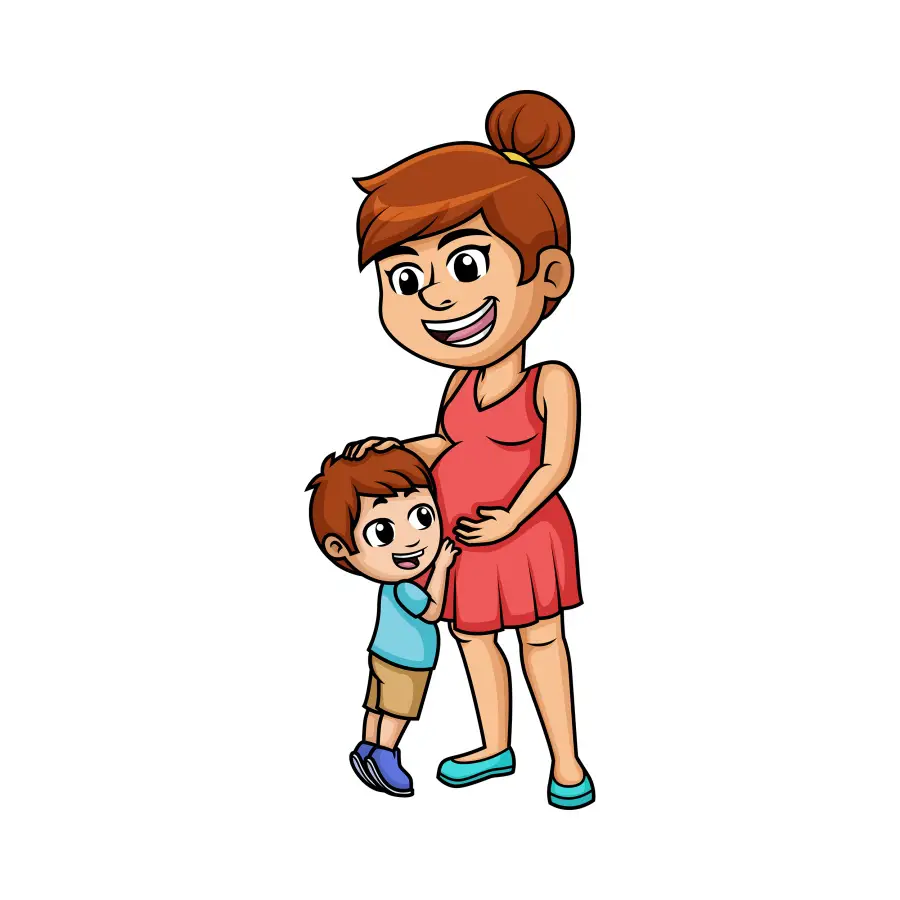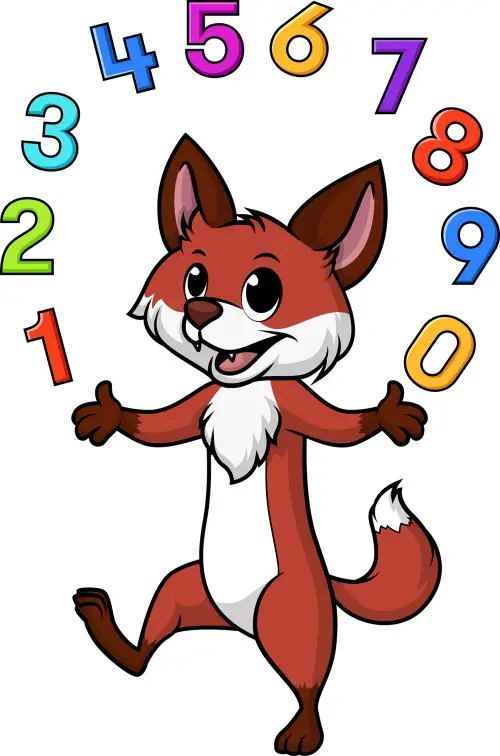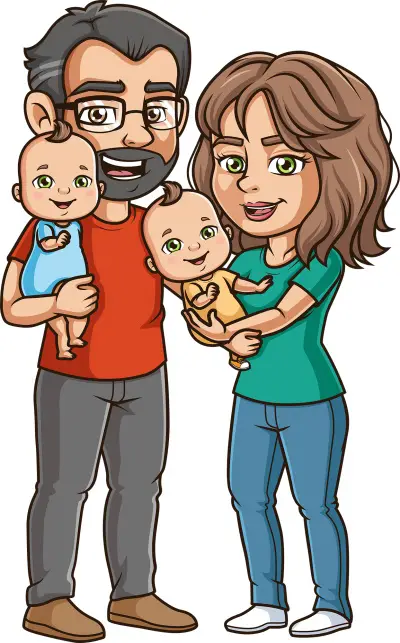As a mom of four, I’ve had several memorable encounters with people who think my husband and I have too many kids. It’s even happened to my husband, too. The best approach for dealing with this really depends on your preference, but it’s good to have some ideas in your back pocket and your reasoning behind what you say to people who think you have too many kids.
When people think or say you have too many kids, they are overstepping. Whether friends, family, or strangers, it’s no one’s business but yours how many kids you have. A curt, ‘thank you,’; a comedic, ‘I agree’; or even saying nothing at all are equally appropriate in this circumstance, then.

This issue of family size, and having too many kids (what does that actually even mean?!), is definitely personal for me, coming from and having a larger family, and I’m happy to share our perspective on it.
Below, then, I’ll share my experiences with people thinking our family is too big and how we’ve handled that, as well as what it means to have many kids, what’s a typical family size, and some real problems associated with big families.
Contents
Why do people think you have too many kids?
Some people who have what’s considered too many kids have taken a comedic approach to it. For instance, this Welcome Mat at Amazon that says “Just So You Know, There’s Like A lot of Kids in Here” is a funny way to warn guests about your family size. But what is it that makes people even think you (or they) have too many kids?
Some people think having too many kids means having more than the norm or typical for the area or culture. Others might think a family has too many kids if the family struggles financially or seems overly chaotic. In truth, though, family size is personal and none of anyone’s business or concern.
You Had Kids Close Together
When women have kids close together, it’s often just more noticeable. Even if a family has only two or three kids, if they are close in age, then it might be a situation more prone for scrutiny or others to say there are too many kids.
If kids are spread out in age, it’s not as likely to bring about comments about ‘too many kids.’ This of course doesn’t make it right.
Just keep in mind that if your family has kids close in age, even if 2 or 3, then you are more likely to hear unwanted comments like ‘you have too many kids.’
I think you’ll also enjoy reading these related parenting articles:
- Why Do People Have So Many Kids? (Revealed)
- How Many Kids Do You Want Is Hard For Some, Easy For Others
- The Real Meaning Behind Thinking ‘I Don’t Love My Kids’
You Have More Kids Than The Average
For sure, if you have more kids than typical for your surroundings, then you are likely to hear comments about having too many kids.
When we moved from the south, where larger families are more normalized, to Los Angeles, we encountered our first instance of someone saying we had too many kids. Surprisingly, it was from a grandma!
My husband drove a cab during our first six months there as he worked to establish his small business. I’m sure it’s not hard to imagine that it was a rough gig indeed! So to help him through it, he had a laminated card on his sun visor showing our four adorable kids. On one occasion he picked up an elderly lady and she noticed them. She remarked, ‘are those all yours?’ And he proudly said, ‘yes’ with a smile. Upon this information, she exclaimed, ‘Please tell me you’re done!’
This was one time when even my husband was shocked speechless!
- Families in US are more likely to have 1 or 2 children.
- Utah has more kids per family in the US than any other state, whereas New Hampshire has the lowest.
- Niger is the country with the largest fertility rate with women having 7 kids each on average.
- The country with the lowest birth rate is Taiwan, followed closely by South Korea.
Your Kids Are Not Well-Behaved
Sometimes people will think you have too many kids but it’s not really even about how many kids you have! Your parenting, or lack of parenting, makes it seem like you have more than you do.
If your kids are not well-behaved, then people are more likely to think you have too many kids. This can happen regardless of how many you actually have. Loud, misbehaving, rude kids draw attention to themselves and your family, so even if you only have two, it looks like you have too many!
So if you have a larger than typical sized family, like 3, 4, or 5 kids, and they are loud, rude, disrespectful or similarly irksome around others, then, it’s likely that people will regard that number as too many, even though it really isn’t about the number of kids you have.
It’s more about your parenting style and lack of proper discipline!
Keep in mind, it’s easy to notice large families too, with 4 or more kids. Basically, anywhere you go, it’s like a small horde coming in, so you get spotted right away. I remember it always felt like all eyes would be on us when I went anywhere with my kids, no matter how they behaved. Thus, if your kids are also not acting appropriately while all eyes are on you, then you bring about negative connotations for large families.
It’s true that more kids require more involvement and more work. That’s just a fact!
It means parents need to be organized and prepared, even more necessary when you have multiple children. Not all parents understand this when deciding to have larger families.
It doesn’t mean you should not have those kids, though. It just means you need to get your act together as a parent!
How many kids are too many?

Often people wonder, how many kids are too many? This is something that especially affects newly married couples, as they contemplate their growing family. But really, ‘how many kids are too many’ is a misguided question.
How many kids are too many is not really something that can be defined. The number of kids to have is personal for each family, and even culturally and religiously connected. It should not be taken lightly, but also shouldn’t be decided by anyone other than the two people responsible for the kids.
To be clear, the decision about the number of kids to have often depends on one’s background, education level, culture, religion, and where one lives.
Let’s look at a few of these more in depth in the sub-sections.
The Average Varies Geographically and Culturally
As mentioned earlier, geography (and all it entails like culture and religion) impacts how many kids families have, and what’s considered too many. It’s only natural for families to do what’s typical.
In the US, it’s the norm for decades to have 2 kids. Having one or three is not abnormal though. Yet, deviating more than that is likely to draw some attention with that expanding as the deviation grows.
Even as a child growing up in a family with four kids (I have three brothers), I was atypical for my peer group. Most of my friends had one other sibling, and a few were only children. This was actually the same for my extended family, with my cousins usually having just one sibling.
The US and Europe are typical in family size, too. Asian countries are less likely to have large families, whereas African countries are more likely to have them.
Religion Plays A Part in Having Many Kids
There are certain religions that put more emphasis on having many kids than other or non-religious families. For example, Catholics and Mormons are two religions that emphasize having many kids.
As a Catholic adult convert, this wasn’t our reason for having four kids. In fact, had we been raised traditionally Catholic or come to Catholicism earlier in our marriage, I firmly feel we’d have even more kids.
Now that we are out of child-bearing years, having two adult children and two ‘almost grown’, we’d love to have had more in our family!
One reason Utah has more kids per family than other states is due to its high Mormon population.
In our Catholic parish, younger families are apt to have more kids than even older generations of Catholics. So ‘having many kids’ seems to be on the rise, at least from our anecdotal observation.
Other Religions With Larger Families:
- Muslims have the largest family size as a whole
- Christianity as a whole has the next largest family size of all religions. Other than Catholicism, ‘fundamental’ Christian sects tend to have many kids.
It’s About Parenting, Not How Many Kids You Have
To really answer how many kids are too many is to know how many kids can a family support. This isn’t just financial, though that certainly plays a part. Families who want to consider how many kids to have need to think about their ability to take care of their children holistically.
Parents must not only be able to provide food, shelter, and safety for their kids, but also emotional and mental care. Being ‘there’ for your child means to put them above everything else.
Granted, we aren’t a child-centered home, so please don’t think that’s what I mean here.
Putting the well-being of your children above all else doesn’t mean you are a child-centered, child-catering, child-focused household.
However, there are many stories of large families where kids where put into adult roles, before they were adults. Parents, you have ‘too many kids’ if you can’t take care of them yourselves!
And again, this doesn’t mean ‘don’t have kids.’ This means: parents, get your act together!
- Kids should not be changing diapers of siblings!
- Kids should not be preparing meals for siblings (or themselves).
- Kids should not be babysitting siblings on a regular basis.
Basically, kids should not be taking on the role of parents!
What to Say to People Who Think You Have Too Many Kids

When you have kids, inevitably you’ll get advice you didn’t ask for! So what do you do when you get advice about having too many kids?
When people say or think you have too many kids, you should feel free to respond however you wish since they are likely giving you unsolicited advice. Some suggestions are to try a comedic or sarcastic approach, or you could say nothing and ignore them altogether.
- Say Thank You…To People Who Think You Have Too Many Kids: You can look them in the eye, smile brightly, and say ‘thanks so much!’ This will probably shock them because it doesn’t exactly fit the situation. It might also provide a bit of clarity about how rude they’re being in contrast, too.
- Say Something Funny About Having Too Many Kids: Another way to respond to someone who says you have too many kids is to be funny or sarcastic. You can say, ‘I agree, which one do you want?’ Or better yet, ‘You’re right! I never thought of that. So who should I give away?’ This seems really dark comedically, but it could lighten the mood a bit and demonstrate to them in a round about way, just how oft-putting their original comment was!
- Say Nothing…To People Who Think You Have Too Many Kids: One unaggressive way to deal with this is to simply say nothing at all. I remember a colleague looking directly at me and saying ‘you’re the reason our insurance is so high!’ I hardly knew her and was quite shocked at what she’d just said, aloud, in front of several other teachers. I didn’t say a word and just looked away. Many others actually came to my defense, so in this case, the best thing for me was to do what I did, ‘nothing.’
- Say Why…To People Who Think You Have Too Many Kids: Of course, if you have time and maybe really care what this person who said this rude thing to you actually thinks, then explain to them why you have ‘so many kids.’ Maybe it’s part of your religious beliefs; maybe you’ve always desired a large family; maybe it just happened that way. Regardless, you could inform this person just how blessed you are for having so many kids and how you wouldn’t change that for anything in the world!
Problems With Having Many Kids
To be sure, having many kids isn’t exactly an easy life! There are reasons some people have come to the idea that people shouldn’t have too many kids when growing their family.
Problems with having many kids are certainly financial with the rising costs of food, education, and healthcare. However, there are also emotional and mental stresses with having many kids. Families who decide to have many kids need to factor in the long-lasting toll it will have on their home life.
- Financial strains on large families: The USDA said that middle-class families spend an average of $13,000 per child under 17 each year to raise them. This is for food, healthcare, childcare, and non-college education (keeping in mind, that education is ‘free’ in the US!). Thus, it’s only fair to say that the more children you have, the more it will cost.
- Emotional strains on large families: Having more kids means there is a larger demand on your time and energy. This takes an emotional toll on you, and everyone else in the family. There’s just simply going to be more ‘drama’ to deal with; more fights among siblings; more arguments to settle; and more to deal with in terms of meeting each child’s socio-emotional needs.
However, it doesn’t mean you shouldn’t have many kids. It just means you will have more to deal with in terms of these issues and you need to be prepared to handle them as they come. It also means you’ll have more people to love, more to talk to, more hugs to give and get, and as you get older, this becomes even more special to you, believe it or not!
The Takeaway for Having Too Many Kids
To takeaway from this, I hope you have come to realize that there really is no such thing as too many kids! Whether you have three or thirteen, it’s your family and you decide. The important thing is that you take care of your family, not how many is in it!
I suggest reading related parenting articles next:
